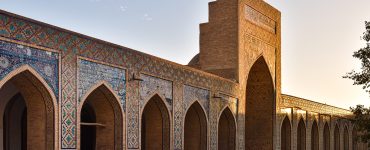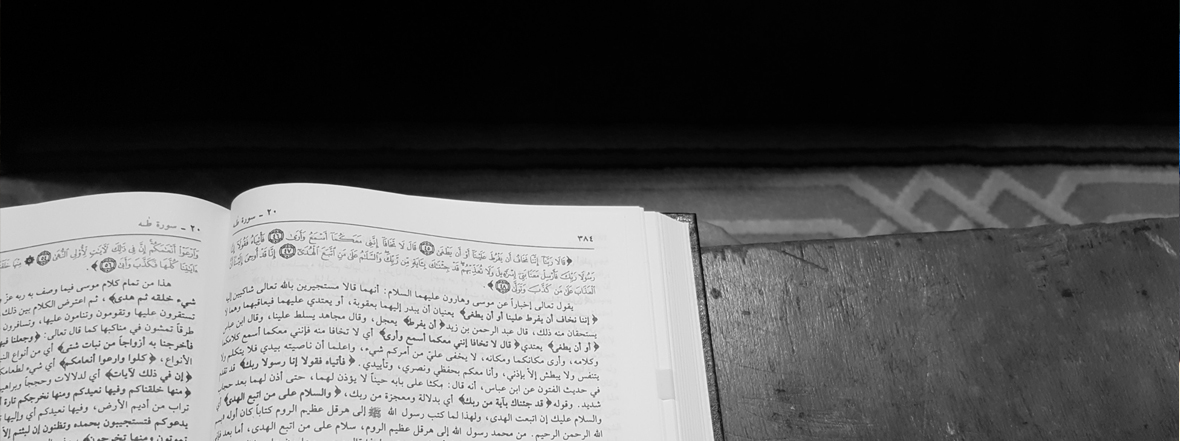An undervalued treasure: Ma’alim Irshādiyyah, penned by the Esteemed Shaykh Muhammad ʿAwwāmah, is an invaluable guide for every seeker of knowledge. This remarkable handbook illuminates the essence of the pursuit of knowledge, brimming with exquisite insights and unparalleled motivation. In this article, we’ll explore just a few of its enlightening treasures.
Why was there no organized course of study in the earliest stages of Islam?
During the time of the Messenger ﷺ, people lived amidst the revelations and the events that prompted them, so there was no need for what later became known as Fiqh and its principles. Their deep understanding of the Qurʾān’s language and their experience of the events leading to divine legislation meant they didn’t require additional study. Whenever they encountered issues, they would directly consult the Prophet ﷺ. For knowledge of the sīrah and siyar—laws related to the Prophet’s ﷺ expeditions—they were the very people who accompanied him during these events. Moreover, they didn’t need formal study of the Arabic language since it was their mother tongue, and they were naturally eloquent.
Similarly, they didn’t need logical sciences like Manṭiq or debate etiquette, which later scholars needed due to their circumstances. Thus, the only essential knowledge was the Qurān and Sunnah, which was the Prophet’s ﷺ responsibility as outlined in Sūrah an-Naḥl: 44:
لِتُبَيِّنَ لِلنَّاسِ مَا نُزِّلَ اِلَيْهِم
“…so that you may explain to people what has been revealed for them…”
Hence, there was nothing besides the revelation and its clarification.
An Essential Prayer for All Seekers of Knowledge [pg 16]
Ibn Abī Shaybah and others report from Umm Salamah that she said: “The Prophet ﷺ would make the following Duʿāʾ at Fajr when he made the salām: ‘O Allāh, I ask you for beneficial knowledge, pure sustenance, and accepted actions.’” In another narration, the wording is “vast sustenance.” This noble prophetic supplication is essential for every Muslim. If he is a seeker of knowledge and education, he has asked Allāh for beneficial knowledge. If he is one searching for some work, he is asking Allāh for pure, Ḥalāl sustenance. During the course of each day and night it is inevitable that one will have to carry out the religious actions which are obligatory upon him, like the five prayers, so he is asking Allāh Taʿālā for accepted actions. Additionally, actions which have not been accepted are rejected and returned to the individual, and [thereby] become a curse upon him.
Ibn Abī Shaybah narrates from Ibn ʿUmar that he used to make the following supplication in prostration, ‘O Allāh, to You my body prostates, and in You my heart believes. O Allāh, bless me with knowledge which will benefit me, and actions which will raise me.” So accepted actions are those that raise the person before his Master and Lord ﷻ.
Warning Against Non-Beneficial Knowledge: [pg 17]
Students should be wary of falling into non-beneficial knowledge, a common trap. O how essential it is for a student to save himself from the external factors and sicknesses of this [type of] knowledge! For this reason, he should take stock of himself and inspect his own intentions before the time is lost.
Among the things which could save him from acts of negligence of this kind would be to read the treatise of Imām Dhahabī, Bayān Zaghl al-ʿIlm wa ’ṭ-Ṭalab.
If a man of knowledge, practice and well-wishing of our time were to write as Imām Dhahabī wrote in his days, he would be extending much good toward students [in particular] and others [in general]. For certainly [one would find], among those who claim to engage in Islāmic jurisprudence, and the Noble Aḥādīth, those whom one would have to be warned about, more than one would be warned about ignorance and the ignorant ones.
The Appropriate Intention for a Seeker of Knowledge [pg 19]
If one were to ask: What would be the appropriate intention for a student to keep with regard to [seeking] knowledge?
I say: It is appropriate that his intention be: Allāh and His pleasure.
The meaning of his intention being Allāh: This should be in his learning, his studying, and in every means [that he uses to gain] knowledge, to such an extent, that even his going, his coming and buying books [is for Allāh].
Even in the shuyūkh that he chooses to accompany, he should accompany such a person whose actions and speech remind him of Allāh, more than that of others, even to the extent of his ʿilmī attire and garb. The student should correct his intention, and beautify his objectives.
As for him seeking Allāh’s pleasure: This is in his practice upon his knowledge, and living in conformity with all the good that he has learnt. He does not come across any Divine or Prophetic commandment except that he hastens to apply it, nor does he come across any prohibition from these except that he refrains from it.
Hardly a few days would have passed upon such a person except that the goodness would be noticed in his nature and conduct, hardly a few years will have passed except that he would become a practicing scholar.
The Four Foundations of Knowledge
Knowledge acquisition is based on four foundations:
1. Knowledge of the Qurʾān and Ḥadīth
2. The student
3. The teacher
4. The teaching methodology between teacher and student.
There is a strong link between these components. The distinction of knowledge comes from its subject matter, which is the book of Allāh and the Sunnah of His Messenger ﷺ, the greatest of all subjects. The student’s distinction is based on what they seek, the teacher’s distinction on what they teach, and education on the outcome it yields.
Have you seen an intelligent person opposing these honorable components? Bazzār and Ṭabrānī transmit a narration from Abī Bakrah with a weak chain: “Be a scholar, student, listener, or lover of knowledge, and do not be the fifth, for then you will be destroyed.” Today, I would add: Be one who serves scholars, spreads their knowledge, opens religious institutions, or supports students.
Diverse Communal Needs Relating to Students of Knowledge [pg 39]
Muslim communities, even if not governed by Islam, have three needs regarding students of knowledge:
1. They require distinguished students to serve as Imāms and Khaṭībs, fulfilling Islamic necessities and rites. A sign of the final hour is the Ummah’s dire need for an Imām, unable to find one, leading to delegation among themselves.
2. Communities need knowledgeable scholars to issue verdicts according to Allāh’s law on important matters (ʾĀlim li ‘l-balad).
3. They need scholars of higher rank for difficult matters, responding to doubts about Islamic sciences, belief, the Qurʾān, Sunnah, jurisprudence, or the Arabic language (ʾĀlim li ‘d-Dawlah).
This final category of scholars should be accessible to Muslims everywhere. Producing such scholars in numbers and proficiency is a collective Muslim responsibility, growing as the need to counter doubts and deviations increases.
The Salvation of a Scholar by Means of His Knowledge [pg 33-34]
An unusual story of a scholar’s salvation through knowledge involves Shabīb bin Yazīd ash-Shaybānī al-Khāriji, a Khawārij leader opposing ʿAbd al-Malik bin Marwān. After Shabīb drowned, ʿItbān al-Ḥarūrī was brought to ʾAbdul Malik, accused of calling Shabīb the “leader of the believers.”
He had revolted against ʿAbd al-Malik bin Marwān, and he died drowning at the end of his life. He used to claim Khilāfah. One of his followers, whose name was ʿItbān al-Ḥarūrī, had recited some couplets regarding him in which he described him with the words “The leader of the believers” and this was in his address to ʾAbdul Malik ibn Marwān (The Khalīfah / leader of the believers at the time:
ومنا حصين والبطين وقعنب … ومنا أميرُ المؤمنين شبيب
From amongst us is Ḥuṣayn, Al-Baṭīn and Qaʾnab
And from amongst us is the leader of the believers, Shabīb
After Shabīb had drowned, the same ʿItbān was brought before ʾAbdul Malik, who asked him:
Are you not the one – O enemy of Allāh – who had said :
ومنا حصين والبطين وقعنب … ومنا أميرُ المؤمنين شبيب
From amongst us is Ḥuṣayn, Al-Baṭīn and Qaʾnab
And from amongst us is the leader of the believers, Shabīb
ʿItbān responded : I did not say that, O leader of the believers. Rather, I said :
ومنا حصين والبطين وقعنب … ومنا أميرَ المؤمنين شبيب
From amongst us is Ḥuṣayn, Al-Baṭīn and Qaʾnab
And from amongst us, O leader of the believers, is Shabīb.
ʾAbdul Malik approved of what he had said and ordered that he should be left to leave.
ʿItbān cleverly used linguistic inflections to reinterpret his words, avoiding execution through his knowledge of [taṣrīf of] speech.
A Father Financing His Son to Seek Knowledge [pg 35-36]
Abū ’l-Ḥasan al-Qābisī al-Mālikī recounts in Ar-Riṣālah al-Mufaṣṣilah Li Aḥwāl al-Mutaʾallimīn from a leader who was the son of a leader, Muḥammad ibn Saḥnūn (203 – 256): A man had a son studying under Ibn Saḥnūn. The father came to the teacher – and what a wonderful father he was – and said to him : I have undertaken the responsibility of working myself, I will not occupy him away from the knowledge that he is seeking. The teacher, Muḥammad ibn Saḥnūn – what a brilliant teacher he was – responded, “Do you know that your reward for doing so is greater than pilgrimage, standing guard [for the Muslims against the enemy] and Jihād?” [This refers to voluntary Ḥajj, standing guard and Jihād which is incumbent upon a group of the people].
In this report there is great lesson for every father or guardian whom Allāh had honoured by directing one of his sons towards seeking knowledge; he should take care of his living expenses, even if that may be to the most basic level, he should free him totally from worldly responsibilities, worldly expenses and worldly occupations, so that he is able to remain stress free and dedicated to his studies.
This brings to mind the narration of Anas ibn Mālik who said, “There were two brothers in the era of the Prophet ﷺ. One would come to the Prophet ﷺ [and learn], whilst the other would work. The worker complained to the Prophet ﷺ regarding his brother. The Prophet ﷺ responded to him, “Perhaps you are receiving sustenance [from Allāh] on account of him.”
The Virtue of the Gatherings of Knowledge [pg 43-44]
Gatherings of knowledge are the light of Islam, sustaining and spreading it. Khaṭīb narrates that Imām Aḥmad called those attending with inkpots “the lanterns of Islam.” Dr. Aḥmad Muḥammad Nūr Sayf elaborates on this analogy, explaining how ink, though dark, produces words of wisdom that enlighten souls and sharpen minds. Dārimī narrates Ibn Sīrīn’s encounter with a gathering of knowledge, where he dreamt of Jibrīl’s presence, highlighting the honored position of such gatherings. This aligns with Abū Hurayrah’s narration about angels surrounding those learning the Qurʾān, as well as Muʾāwiyah’s account in Ṣaḥīḥ Muslim, where Allāh boasts to His angels about these gatherings.
Khaṭīb narrates with his chain to Imām Aḥmad, ‘The people of Ḥadīth came to him with inkpots in their hands. He gestured to them and said: “These are the lanterns of Islām.”’
When I read this narration in the source mentioned, I wished to explain this great analogy, but then saw that the honourable, learned Dr Aḥmad Muḥammad Nūr Sayf had already written adequately on this in his intriguing book: Min Adab al-Muḥaddithīn Fī ‘t-Tarbiyyah wa ‘t-Taʾlīm. He says, may Allāh reward him well, “This is a wonderful comparison, for though the inkpot interior is darkened with ink, the light of guidance and right conduct radiates from it’s many darknesses itself; when [the tips of] the pens become immersed in it and then flow onto sheets of paper and parchments, such words of wisdom and subtle meaning are recorded which bring life to the souls, sharpen the minds, and eliminate doubts and delusions, and lead confused hearts to the light of Islām.”
An encouraging narration on this subject is one that Dārimī has narrated from Ibn Sīrīn: He [once] entered the Masjid and saw Ḥumayd ibn ʾAbd ar-Raḥmān al-Ḥimyarī in a circle of knowledge, and another man telling stories. Uncertain as to which of them he should sit with, he eventually sat [with one of the groups]. Drowsiness dawned on him and then slumber overtook him. He says: A person came to me [in a dream] and said, “You hesitated – meaning you were uncertain – as to which of them you should sit with?! If you wish, I will show you the place of Jibrīl [in the gathering] with Ḥumayd ibn ʾAbd ar-Raḥmān.”
My sole intention for mentioning this narration is to direct attention to an additional point famously known from the narration of Abū Hurayrah (Allah be pleased with him): The angels – in general – surround the gatherings of those learning the book of Allāh Taʿālā, and this [learning the book of Allāh Taʿālā is part of knowledge.”
The narration of Muʾāwiyah (May Allah be pleased with him) is in Ṣaḥīḥ Muslim as well : “Allāh Taʿālā boasts to His angels – in general – about the people of this gathering.” As for this narration of Dārimī, it has mention that the leader of all the noble angels (peace be upon them all), who is Jibrīl, is present in the gathering of knowledge.
♦
This article was transcribed, translated and prepared by a student who attended a course hosted by Siblings of Ilm titled; ‘A reading of Ma’alim Irshādiyyah’ with Mufti Ismail Moosa – May Allah reward them for their efforts.






